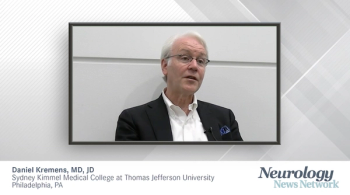
Daniel Kremens, MD, JD, provided commentary on a number of various amantadine formulations for Parkinson disease, and how timing of dosing impacts efficacy.

Daniel Kremens, MD, JD, provided commentary on a number of various amantadine formulations for Parkinson disease, and how timing of dosing impacts efficacy.
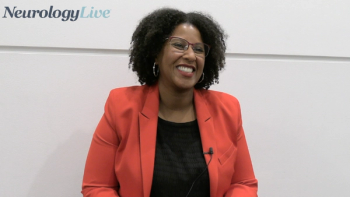
The full professor of chemistry at Vanderbilt University talked about research surrounding racial and ethnic disparities in Alzheimer disease incidence. [WATCH TIME: 5 minutes]
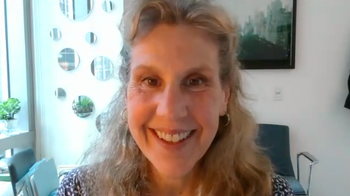
The professor of neurology at the NYU Grossman School of Medicine provided commentary on a study that demonstrated the benefits of using tDCS along with sleep language training to promote naming in primary progressive aphasia. [WATCH TIME: 5 minutes]
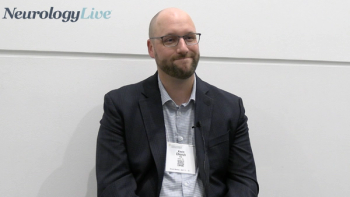
The chief scientific officer at Athira talked about the potential of hepatocyte growth factor compounds in promoting neurotrophic signaling and providing broad neuroprotection across neurodegenerative diseases. [WATCH TIME: 6 minutes]
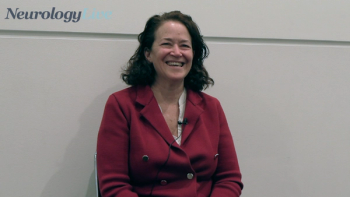
The chair of neurology at Massachusetts General Hospital talked about results from the phase 2b PARADIGM trial assessing PrimeC, an ALS combination agent that consists of ciprofloxacin and celecoxib. [WATCH TIME: 4 minutes]
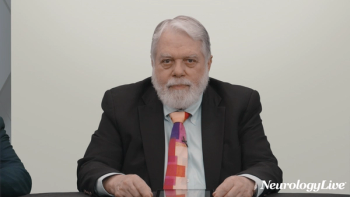
Expert neurologists share approaches to switching MG treatment due to either poor disease control or adverse events.
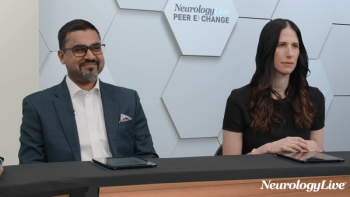
Experts in neurology review the varied routes of administration of targeted treatment in MG, highlighting intravenous and subcutaneous formulations and how they can provide more patient-centric care.
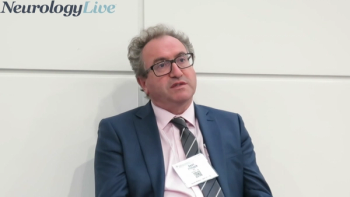
The director of the Mayo Clinic Center for Multiple Sclerosis and Autoimmune Neurology discussed the safety of ravulizumab and the ways to avoid risks of meningococcal infection. [WATCH TIME: 3 minutes]
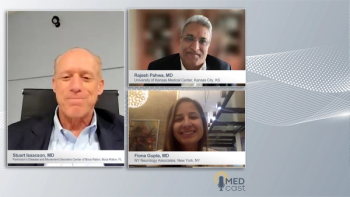
Drs Isaacson, Pahwa, and Gupta discuss the management of dyskinesia and providing good ON time in Parkinson’s disease, sharing practical tips for early identification and treatment of dyskinesia, as well as their experience with current treatments.
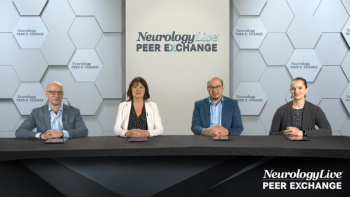
Ahmed Obeidat, MD, PhD, Riley Bove, MD, Stephen Krieger, MD, and Erin Longbrake, MD, PhD, review strategies for optimizing treatment of women with MS who are pregnant while minimizing risks. They also talk about evolving approaches to managing women who are breastfeeding.

Ahmed Obeidat, MD, PhD, Erin Longbrake, MD, PhD, Stephen Krieger, MD, and Riley Bove, MD, discuss differences in immunologic phenotypes across racial boundaries. They also discuss data showing that, despite these differences, response to high-efficacy agents appears to be consistent regardless of race.
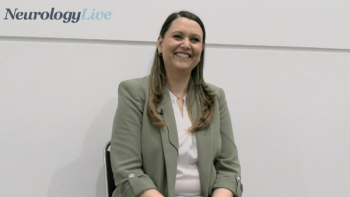
The director of the MedStar Georgetown Headache Center talked about an intravenous migraine treatment that could offer long-term relief for most patients who respond well to the initial dose. [WATCH TIME: 5 minutes]
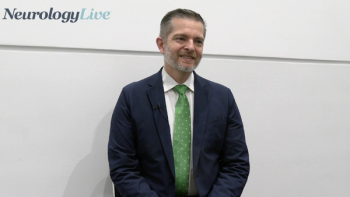
The assistant professor of neurosurgery and biomedical informatics at the State University of New York at Buffalo talked about the efficacy and safety of using embolization as a promising treatment for subdural hematomas. [WATCH TIME: 3 minutes]
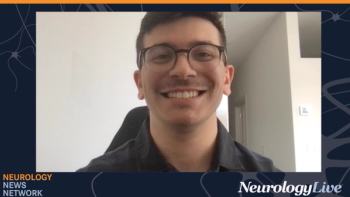
Neurology News Network. for the week ending April 20, 2024. [WATCH TIME: 3 minutes]
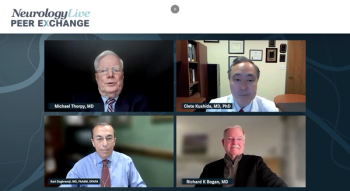
Drs Thorpy, Dogan, Doghramji, and Kushida detail which medications to use in various patients with narcolepsy.

Experts in sleep medicine summarize the available safety data on various agents for the treatment of narcolepsy.
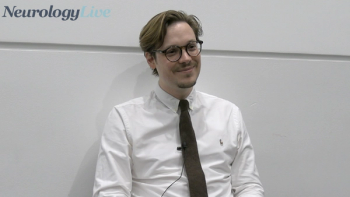
The instructor in neurology at Brigham and Women's Hospital talked about research exploring takotsubo syndrome, a heart condition often triggered by emotional or physical stressors, and its relationship with brain lesions. [WATCH TIME: 5 minutes]
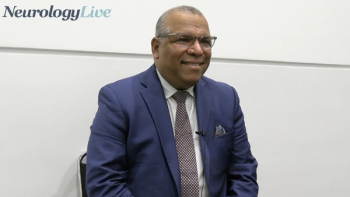
The chief of the Division of MS and Neuroimmunology at UConn Health talked about the unevenly distributed progress in multiple sclerosis care, impacting minority populations who often face worse disease outcomes. [WATCH TIME: 6 minutes]

The assistant professor of neurosurgery and biomedical informatics at the State University of New York at Buffalo talked about the potential of embolizing the middle meningeal artery in patients with subdural hematomas. [WATCH TIME: 4 minutes]
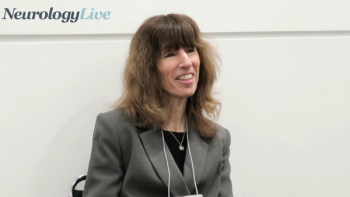
The assistant professor of neurology at Harvard Medical School talked about integrative therapies that may offer promising alternatives to traditional treatments for aiding neurological conditions. [WATCH TIME: 5 minutes]
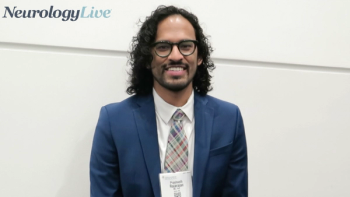
The neurology resident at Massachusetts General Brigham talked about assessing the safety of cancer treatments in patients with multiple sclerosis using checkpoint inhibitors. [WATCH TIME: 6 minutes]
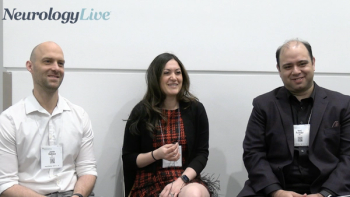
A trio of experts from university hospitals discussed a study that aimed to uncover the prevalence and associations of limb swelling in patients with Dravet syndrome in hopes of improving care. [WATCH TIME: 5 minutes]

The professor of neurology at the NYU Grossman School of Medicine discussed a study presented at AAN 2024 highlighting the risks of cannabis use in patients with multiple sclerosis. [WATCH TIME: 4 minutes]
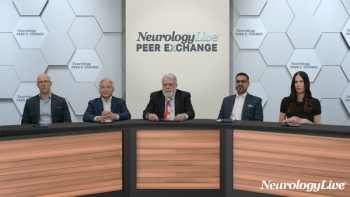
Expert neurologists discuss the treatment algorithm of MG, focusing on the use of targeted therapies as well as barriers to their use.
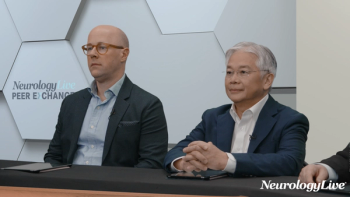
Nicholas Silvestri, MD, FAAN, and Tuan Vu, MD, provide an overview of the current FDA-approved targeted therapies for the treatment of MG.
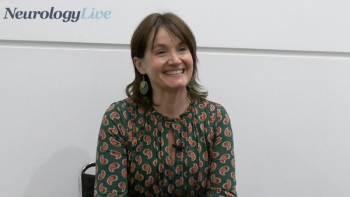
The associate professor of neurology at University of California, San Francisco talked about findings from an analysis that assessed the safety of ocrelizumab when administered close to pregnancy. [WATCH TIME: 5 minutes]
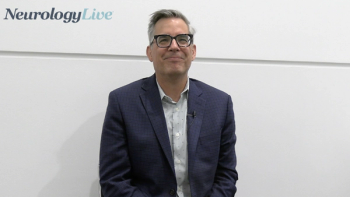
The executive vice president of research at National MS Society talked about the Dystel Prize which is presented at AAN to a recognized individual who promotes further advancements in understanding and treating MS. [WATCH TIME: 3 minutes]

Ahmed Obeidat, MD, PhD, Erin Longbrake, MD, PhD, Stephen Krieger, MD, and Riley Bove, MD, discuss strategies for personalizing decisions and mitigating risks when stopping medication.

Ahmed Obeidat, MD, PhD, Riley Bove, MD, Stephen Krieger, MD, and Erin Longbrake, MD, PhD, discuss the definition of high-efficacy therapy and its place in MS care.
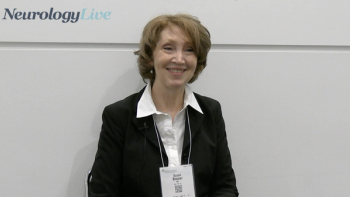
The medical director of the Weill Cornell Medicine Headache Program discussed key essential knowledge on the diagnosis, treatment, and pathophysiology of different headache types. [WATCH TIME: 6 minutes]